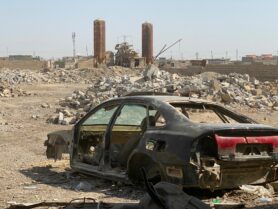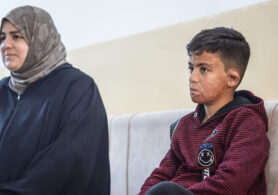The Remote Warfare roundup is a bi-weekly digest of unfolding news, op-eds and reports relevant to remote warfare. This round-up is written by Aoife Keogh.
French Airstrike Killed Malian Civilians According to UN Investigation
The United Nations Multidimensional Integrated Stabilization Mission in Mali (MINUSMA) has investigated a French air-strike occurring on January 3rd 2021, in the Malian village of Bounty, which resulted in 22 casualties.
A day after the strike, MINUSMA sent in a team to investigate the assault. The team consisted of fifteen human rights officers, two forensic experts, and two public information officers. The investigation conducted over 115 interviews with locals and over 150 documents including photographs, government documents and newspaper articles related to the air-strike.
The investigation concluded that there were 22 casualties, 19 of them were civilians, while 3 were members of the militant group Katiba Serma. The victims were attending a wedding at the time of the attack. All the victims were male aged from 23 to 71.
Based on their findings, MINUSMA is recommending that the French and Malian authorities conduct their own investigations into the air-strike.
In a statement on January 7th, the French government claimed that the air-strike had killed 30 Islamic fighters, however, Human Rights Watch had doubts regarding this claim and called for an impartial investigation. After the MINUSMA report was published, the French Ministry of Defense stated it had concerns about the methodology used in the report.
France currently has 5,100 troops stationed across the Sahel region to fight militant groups with links to Islamic State and Al-Qaeda. The French operation in Mali is known as Operation Barkhane.
The current crisis in Mali began in 2012. When separatists groups from the North of the country rebelled with support from various Islamic militant groups including Ansar Dine, Islamic Maghreb (AQIM) and Al-Qaeda. The unity among these groups was short-lived and various factions took control of territory in the north, pushing south toward the capital Bamako. At the request of the Malian government, the French intervened in 2013 and have remained a prominent actor in the conflict. As well as the French deployment, a UN peacekeeping mission was established, MINUSMA, which has seen the deployment of 15,000 soldiers since its inception and has been labelled one of the most dangerous UN missions.
The French have supplied Operation Barkhane with a significant arsenal including 3 Reaper drones, 7 Mirage 2000 combat aircrafts, 21 combat and force utility helicopters and between 6 and 10 tactical and strategic lift aircrafts (Stoicescu, 2020, p. 7).
An analyst at the US-based security consultancy Rand, Michael Shurkin commented on the French militaries activities in Mali arguing:
“The battle over Barkhane’s image is more important than any actual battle in this kind of conflict,” he further added “The French government and military have been slow to engage in ‘information warfare’,” he added, saying that “doing ‘propaganda’ makes the French military nervous.”
(France24, 2021).
The concept of an information war has been used in the context of remote warfare, particularly in reference to the number of civilian casualties. Co-founders of IRW Dr. Prof. Jolle Demmers and Dr. Lauren Gould along with David Sneltselaar discuss this phenomenon and refer to the contestations between the numbers of civilian casualties as the ‘politics of truth’ in their chapter ‘Perfect War and its Contestations’ (Sneltsar, Demmers, and Gould, p. 240).
Sources and more information:
To read about the French Airstrike in Mali.
To read about the UN investigation into the air-strike
To read more about the conflict in Mali.
British Jets re-engage in the fight against ISIS
The British Ministry of Defense released information on Thursday the 8th of April about a Royal Air Force (RAF) attack against ISIS fighters in Iraq this Spring. The attack took place over ten days in March, ending on the 22nd. The RAF acted as part of the US-led coalition against ISIS. They assisted Iraqi ground forces by striking a network of caves in the Makhmour Mountain region in South Erbil, where it is believed 100 or more ISIS fighters were hiding. The Makhmour mountains are strategically difficult for security forces to reach due to their rough terrain and position between the Iraqi government controlled southern territory and Kurdish controlled northern territory.
The RAF used three Typhoon FGR4 fighter jets and attacked with storm shadow missiles to target the mountain’s difficult landscape. The British Ministry of Defense did not release an exact number of casualties from the assault but estimates that dozens of combatants were killed.
The attack is the Coalition’s biggest assault on ISIS fighters in two years and is part of a long battle against the estimated 10,000 ISIS fighters who remain in Iraq and Syria. It follows the UK integrated review of Defense and Foreign Policy, which was released last month. Prime Minister Boris Johnson stated in reference to the review that it is “…the biggest investment in defense since the Cold War” confirming Britain’s commitment to fighting terrorism in the region (Arab News, 2021).
Within the same statement, the British Ministry of Defense also disclosed an attack against ISIS fighters in Syria. According to their statement, the attack was part of a separate operation and took place on April 4th in Northern Syria near Al Hasakah. The UK claimed that no civilians were killed in the assault.
Chris Coles, director of Drone Wars told the Guardian:
“With few boots on the ground there is almost no pressure to bring military interventions to an end and so we are likely now to see British aircraft and drones engage endlessly in sporadic bouts of bombing with almost no visibility of the consequences for those on the ground,”
(Sabbagh, 2021).
Dr. Lauren Gould and Prof. Dr. Jolle Demmers of IRW discuss practices of remote warfare and how they lead to the phenomenon of endless wars in their article The Remote Warfare Paradox. Demmers and Gould predict that because of the lack of visibility and accountability in Western public sphere leaves little repercussions for this form of warfare. Making Western countries more war prone, rather than less.
Sources and more information:
To read the British Ministry of Defense Statement about the attack.
To read more about the attack from:
- Arab News – British jets engaged in 10-day anti-Daesh campaign in Iraq
- Reuters – Britain says it struck Islamic State militants in Iraq last month
- The Guardian – RAF engaged in 10-day attack on Isis in Iraq this spring.
Yemen: No clarity on U.S vow to end support for Saudi/UAE Coalition
It has been six years since the Saudi/UAE led coalition began military operations in Yemen. The coalition is against the militant group Ansar Allah, also known more commonly as ‘Houthi’s’.
Six years of fighting has led to devastating conditions for civilians on the ground with the UN calling the situation in Yemen “the worst humanitarian crisis in the world.”
The Yemini human rights group Mwatana for Human Rights has documented human rights violations committed by all actors engaged in the conflict including the Saudi/UAE coalition, the Yemeni government and the Houthi’s.
According to the human rights group, the Saudi/UAE Coalition are responsible for hundreds of air-strikes that have killed thousands of civilians and damaged vital civilian infrastructure including hospitals and health-centers. They also argue these assaults are indiscriminate and disproportionate, amounting to war crimes.
Mwatana has documented a number of foreign weapons used in these air-strikes, including U.S weapons in 25 air-strikes, UK weapons in 5 air-strikes, and Italian weaponry in one air-strike.
Radhya Al-Mutawakel, the chairperson of the group has stated
“After years of war in Yemen, instead of the conflict ending as civilians desperately need, the conflict is evolving and escalating, and the warring parties continue to grievously harm civilians”.
(Matwana, 2021)
During his presidential campaign, U.S President Joe Biden promised that once in office he would re-evaluate the U.S support to the Saudi/UAE Coalition. Following this, President Biden announced on February 4th that he would end “all American support for offensive operations in the war in Yemen, including relevant arm sales” but that the U.S would continue to support Saudi Arabia in defensive operations (The Intercept, 2021). Between 2016 and 2020 the US sold arms to Saudi Arabia accounting for 79% of the coalitions weaponry.
However, it has been two months since this announcement and there has been no clarity on what actions have been taken to break support for the Saudi/UAE coalition. 41 members of Congress wrote to President Biden in support of his decision but asking for clarity on the actualities of these actions and what will be considered ‘relevant’ in arm sales. However, they have not yet received a response from the President.
Hassan el-Tayyab, Middle East lobbyist at Friends Committee on National Legislation (FCNL) told Aljazeera that “in a situation where a child may die every 75 seconds, hours matter, days matter, weeks matter and we just don’t have time here to be sitting on our thumbs.”
(Stepansky, 2021).
After Biden’s announcement in February, Australia followed suit and freezed arms sales to Saudi Arabia. However, France, Spain and the UK have resisted pressure to end their arms sales to Saudi Arabia. Since 2016, arms sales from the UK account for 9% of Saudi imports.
The support to the Saudi/UAE Coalition including arms sales illustrates the complex network of both private and public actors which are present in contemporary remote warfare, despite the documented casualties and devastating impact on civilians on the ground.
Sources and more information:
To read about the developing situation in Yemen from Matwana for Human Rights.
To read about the U.S withdrawal of support for Saudi/UAE coalition:
- Aljazeera –
- Human Rights Watch – Australia: Freeze Arms Sales to Saudi Arabia, UAE.
Secrecy within U.S Drone Program Prohibits Whistleblowing
It is well known that secrecy and remote warfare go hand in hand, in the case of Daniel Hale, we see how the status of secrecy trumps the importance of whistle-blowing in U.S military institutions.
Hale, 33 is a former intelligence analyst at the National Security Agency and a contractor at the National Geo-spatial Intelligence Agency. During his career, Hale worked on the U.S Drone Program where he admitted to leaking classified documents to a journalist. Hale was charged for leaking the documents under the Espionage Act and had been set to go on trial next week, instead he pleaded guilty to one count of breaching the Espionage Act, which is punishable with a maximum of ten years in prison. He is due to be sentenced on July 13th.
After working as an intelligence analyst for the Air Force in the National Security Agency, Hale became a contractor for the National Geo-spatial-Intelligence Agency in 2013. According to court records, it was during this time that Hale reached out to a journalist who had reportedly just released a book about the U.S military’s use of drones. While the journalist is unnamed in the court case, it is widely suspected that the journalist is Jeremy Scahill from the Intercept.
According to court documents, over the course of a year, Hale provided the journalist with secret and top-secret documents. These documents are believed to have been the source for the Intercepts series on drones called “The Drone Wars”. According to the series:
“Taken together, the secret documents lead to the conclusion that Washington’s 14-year high-value targeting campaign suffers from an overreliance on signals intelligence, an apparently incalculable civilian toll, and — due to a preference for assassination rather than capture — an inability to extract potentially valuable intelligence from terror suspects.”
(Scahill, 2015).
The online publication further argues that the secret documents illustrate how the killing of local insurgents within this process exacerbates threats to the U.S rather than quelling them.
Last year, Hale’s lawyers attempted to get the case thrown out on the grounds of the 1st amendment. They further argued that Hale was being convicted for leaking negative information about the drone program but when positive information was leaked, government officials were not concerned. Lastly, they asserted that the Espionage act was a danger to whistle-blowing, freedom of speech and the free press. Their attempts to get the case thrown out were unsuccessful.
The Espionage Act has been criticized by Jameel Jaffer, director of the Knight First Amendment Institute at Columbia University, who asserted that the act makes no distinction between those who leak government secrets to other countries or for their own monetary gain and those who are trying to whistle-blow on a problem within their own government. Furthermore, under the act, journalists who receive secret government documentation can be prosecuted for writing about their content.
Sources:
To read about the case:
- ABC News – Analyst pleads to leaking secrets about drone program.
- The Washington Post – Former intelligence officer Daniel Hale pleads guilty to leaking classified information.
To read The Intercept series The Drone Papers
To watch the documentary National Bird where Daniel Hale and other former intelligence officers discuss the US Drone Program.



